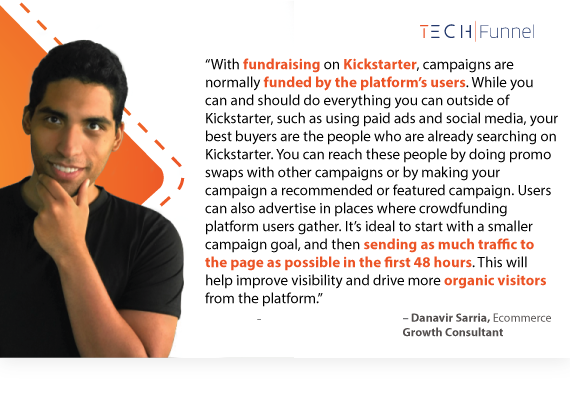The rise in the number of SaaS startups and venture capitalists’ interests in B2B tech companies has led to a growing curiosity about crowdfunding. It has even given a fillip to websites like Kickstarter, which helps even laypersons to get funding for projects close to their hearts. Crowdfunding primarily uses small amounts of capital from several individuals to finance a new business venture.
Think of it like a money pool, where participants hope their small contributions to a project will pay off big time when that project gets off the ground and becomes a success. Crowdfunding can also be used for contributing to help a cause or a person in need.
Leading Crowdfunding Platforms
There are many options to consider when selecting a crowdfunding website to meet your goals. Some platforms are well-known and all-encompassing, while others are more aligned to a specific target audience.
1. Kickstarter
This popular platform helps entrepreneurs, startups, and SMEs to fund their projects. Kickstarter also collaborates with creative individuals like writers, filmmakers, and independent artistes to get financial support for their initiatives and helps promote a user’s campaign.
2. GoFundMe
GoFundMe is geared towards individual fundraising. Following its launch in 2010, GoFundMe has brought in about $5 billion in funding for various projects, including service-oriented fledgling businesses.
3. Seedrs
This UK-based crowdfunding platform’s expertise lies in helping startups to pitch their ideas successfully to seek funding from potential investors. Startup founders can get help to project their vision using Seedrs, which has an above-average success rate.
How to Make Crowdfunding Work for Your Business?
The platforms mentioned above are geared toward different audiences, and small businesses and startups must choose their crowdfunding platform based on who they gauge to be their best investor pool from groups of audiences. These platforms can be used to alert investors on potential projects, and if you play your cards right, your projects can raise more than you originally pitched for.
Businesses can learn to craft a successful pitch for investors from examples of crowdfunding campaigns that went viral. The movie version of the TV series ‘Veronica Mars’ started as a crowdfunding campaign on Kickstarter, with over 90,000 fans pitching to the tune of $5.7 million to make the film a reality. Started as a pitch for $2 million, and fans raised three times the pitch.
Another viral crowdfunding campaign is that of the popular office desk toy Fidget Cube, which raised $6.4 million on Kickstarter.
Like in the case of Veronica Mars, if you already have patrons for your concept or product, it helps with the marketing of your startup company or project and in turn, with raising the funds for it. When there is already a big demand for what you are trying to sell, people will pitch in with funds more easily.
However, to get more bang for your buck, using social media platforms is also an effective way to get your crowdfunding campaign in front of larger audiences. For instance, if you have a crowdfunding campaign that centers around a social cause, then Twitter may be your best bet.
For spreading the word about a tech startup, niche-oriented sites like Reddit or LinkedIn are the more appropriate platforms. Once you know your target audience and the spaces they frequent, you can focus on presenting your project in the best possible way to attract maximum funding.
When did Crowdfunding Start?
If one were to trace crowdfunding as a concept, we might be taken way back to the 17th century. Today’s crowdfunding can be backtracked to the late ’90s when a UK rock band raised funds from fans for a reunion concert tour. Now with digital marketing, crowdfunding has received a huge boost, as it is popular with entrepreneurs looking for financial support for their ideas. Crowdfunding revenue tripled from $530 million in 2009 to $1.5 billion in 2011.
The model got a fillip when the US federal government brought the Jumpstart Our Business Startups (JOBS) Act into law to ease the legal obligations of small businesses by legitimizing equity crowdfunding. Now, small businesses can get funding for their projects from online investors in return for equity ownership in the business.
If the startup business becomes successful, then the investors stand to gain to the extent of their contribution to building the said business. This is different from rewards-based crowdfunding, where investors receive incentives for their support, like in the case of ‘Veronica Mars,’ where some of those who funded the film got walk-in parts in the movie.
As per the US Securities and Exchange Commission, private businesses are within their legal bounds to raise $5 million in a 12-month period through equity crowdfunding. Once you keep the federal restrictions in mind and ensure your organization is in good standing per the law, there is no stopping a startup business from becoming an industry powerhouse through equity crowdfunding. And there are quite a few small businesses that launched and grew to the next level using crowdfunding.
Final Thought
Crowdfunding can get a boost from anyone, including corporate investors, a community of fans like in the case of Veronica Mars or small investors who believe in a startup. A startup business, an independent project, or a fundraiser for a social cause can all come to fruition by finding the right audience that would be interested in your product or service.
Crowdfunding platforms like GoFundMe and Kickstarter can elevate your campaign and bring it in front of the right audience. Social media platforms can boost your marketing campaigns to target more niche audiences. The history of crowdfunding has shown us that humble businesses have gone big with crowdfunding, making it the ideal fundraising avenue for businesses to innovate more.



/cdn.vox-cdn.com/uploads/chorus_asset/file/7947653/figetcube.gif)



